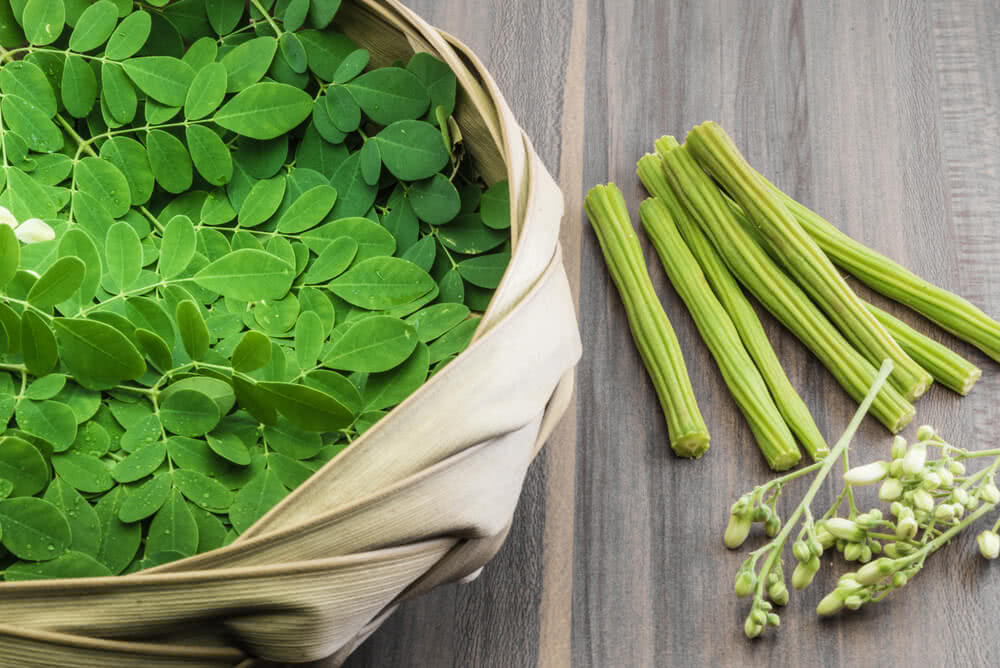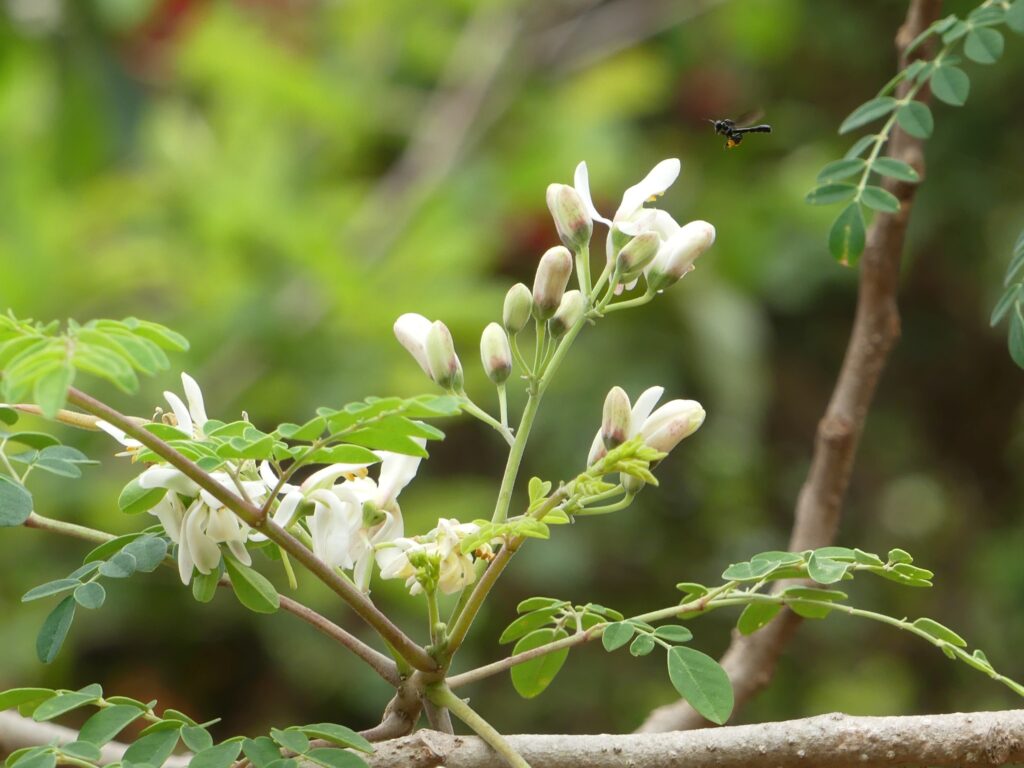Moringa is a tree that has antioxidant and anti-inflammatory properties. Also known as the drumstick tree, miracle tree, ben oil tree, or horseradish tree, people have been using moringa for centuries because of its health benefits. Its leaves, seeds, and seed pods are all edible and rich in nutrients, and this hardy tree thrives even in dry, hot conditions. Its seeds make a healthy cooking oil that never spoils.
Why is Moringa Considered a Superfood?
Due to its nutritional properties, powdered moringa has become a popular health supplement around the world. But as the plant continues to spread around the world, more and more people are having the opportunity to eat its delicious leaves and pods, even in colder countries where it is grown in containers.

Moringa may have many health benefits, ranging from speeding up wound healing to regulating blood sugar. However, more research is needed on its benefits.
How Can Moringa Improve Your Health?
- Moringa contains several essential compounds, such as:
- vitamin A
- vitamin B1 (thiamine)
- vitamin B2 (riboflavin)
- vitamin B3 (niacin)
- vitamin C (ascorbic acid)
- calcium
- potassium
- iron
- magnesium
- phosphorus
It is also low in fat and contains no harmful cholesterol.
What to look for when buying moringa?
If you find fresh moringa leaves at a farmers market or grocery store, try to choose dark green leaves where the smaller leaves are still attached to the stem. The beans are rare outside of warmer regions but if you find them, look for beans that are about six inches long, green and still relatively tender. The beans can be large and still edible as long as they are not dry. Older beans with mature seeds are not edible, but you can use the seeds for cooking.

Learn About the Medicinal Properties of Moringa.
The moringa plant is a treasure trove of nutrition, providing high amounts of vitamin C, vitamin E and calcium. Compared to many other leafy vegetables, the moringa leaf is also very high in protein. The pods are very high in both protein and fiber. The leaves, pods and seeds contain high amounts of heart-healthy oils. Moringa also contains many complex compounds, phytochemicals, that promote health through their anti-inflammatory, antidiabetic and anticancer properties.
Although some nutrients, like vitamin C, don’t survive processing well, dried moringa powder contains a concentrated source of certain minerals, like calcium, phosphorus, potassium, and iron.
- केला के बारे में ऐसे अद्भुत तथ्य जो आपने नहीं पड़े होंगे Part 2
- पृथ्वी / Earth Top 30 amazing fact about that don’t know
- Age Calculator
- 200 Interesting Facts/तथ्य That You Don,t Know
- Khasra और Khatauni भूलेख पोर्टल पर कैसे निकाले? 2025-26
Moringa: A Natural Remedy for Skin and Hair.
A study conducted in a laboratory suggested that moringa may help skin wounds heal faster. One way it does this is by reducing oxidative stress.
According to some experts, moringa seed oil may also benefit hair health.
However, more studies are needed, especially studies involving humans.
How Moringa Can Keep Your Digestive System Healthy.
Moringa extract may help treat certain stomach ailments.
For example:
- The leaves may help prevent colon cancer.
- Moringa leaves have been found to have laxative effects, making moringa a potential option for constipation.
- It may reduce stomach acid secretion, which suggests it may prevent peptic ulcers.
- Moringa may help prevent ulcerative colitis because its anti-inflammatory effects may protect the digestive system from damage.
However, all of the above studies were conducted on animals. Therefore, the findings may not apply to humans, and more clinical research is necessary.

Moringa and Inflammation: What’s the Connection?
Contains molecules that may help control or prevent asthma, bronchial contractions, and airway inflammation.
One study found that guinea pigs’ lung function improved after researchers gave them moringa extract.
However, these findings may not apply to humans. Additional studies on humans are necessary.
Moringa and Inflammation: What’s the Connection? (Moringa and Inflammation: What’s the Connection?)
Moringa contains molecules that may help control or prevent asthma, bronchial contractions, and airway inflammation.
One study found that guinea pigs’ lung function improved after researchers gave them moringa extract.
However, these findings may not apply to humans. Additional studies on humans are necessary.
Easy Ways to Include Moringa in Your Diet.
To use the leaves, you’ll need to separate the leaves from the branching stems. To save effort, some cooks recommend wrapping bunches of leaves in newspaper for a few hours before cooking—the dry newspaper will encourage the leaves to separate from the stems with just a gentle shaking. You can also remove the leaves by pulling them through holes in a sieve or colander, leaving the leaves behind.
The leaves can be fried or boiled just like spinach, although they are much more nutritious. They can also be cooked with lentils into delicious dals and curries. In West Africa, where moringa has become very popular, the fresh leaves are ground with spices and other ingredients to make a rich sauce for meat and other foods. Moringa powder can be substituted as a shortcut in many of these recipes. In Senegal, moringa leaves are mixed with ground peanuts and served with couscous in a dish called maboom. Moringa can replace spinach or other cooked greens in many Western dishes, such as this quiche.
Powdered moringa leaves are also popular, and can be added to green smoothies, sprinkled over savory dishes, and even mixed into baked goods like muffins for an extra boost of vegetables.
Fresh pods, sometimes referred to as drumsticks, are traditionally added to curries in India and other regions where the fruit is popular. The pods can also be roasted or stir-fried in place of green beans in many recipes. Younger beans can be cooked whole or cut into large pieces, although older, fibrous beans will be easier to eat if cut into pieces and partially peeled.
If you buy pods with mature seeds, you can scrape them out and eat them roasted, although large quantities may have a laxative effect, so don’t eat too many at once. Moringa seeds are often pressed into high-quality cooking oil, although this is difficult to do at home without special equipment.
Does Moringa affect thyroid?
A 2021 article states that Moringa may help support thyroid function. However, it may also cause problems if a person is taking other thyroid medications. A person should talk to a doctor before taking Moringa.
What is Moringa used for?
Moringa may have many health benefits, such as protecting and nourishing hair and skin, treating inflammation, protecting the liver, treating upset stomach, fighting foodborne bacterial infections, and improving eye health.
- Ozempic अब भारत में: मधुमेह और वजन प्रबंधन में एक नया अध्याय
- Aaj Ka Rashifal: Daily Rashifal, 13 december 2025
- Firozabad AQI 221: हवा में घुला ‘जहर’! 13 december 2025
- Mexico to Impose Steep Tariffs on Indian Imports from 2026
- Mexico Imposes Tariffs on Indian Imports Amidst Growing Trade Imbalance

2 thoughts on “Do you know these 10 Moringa miraculous benefits?”